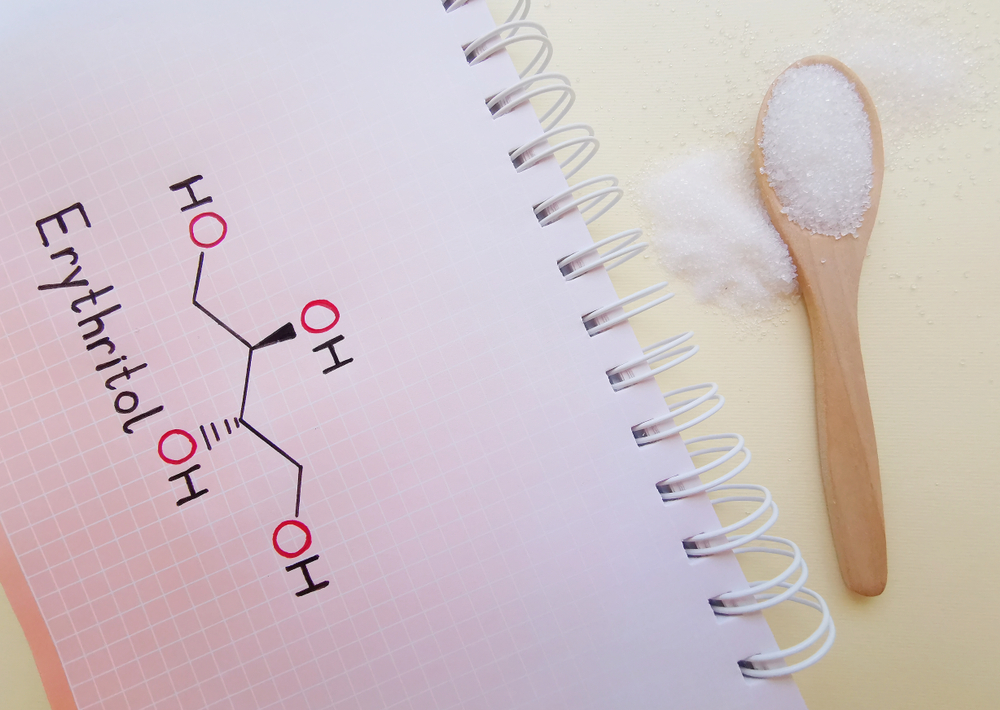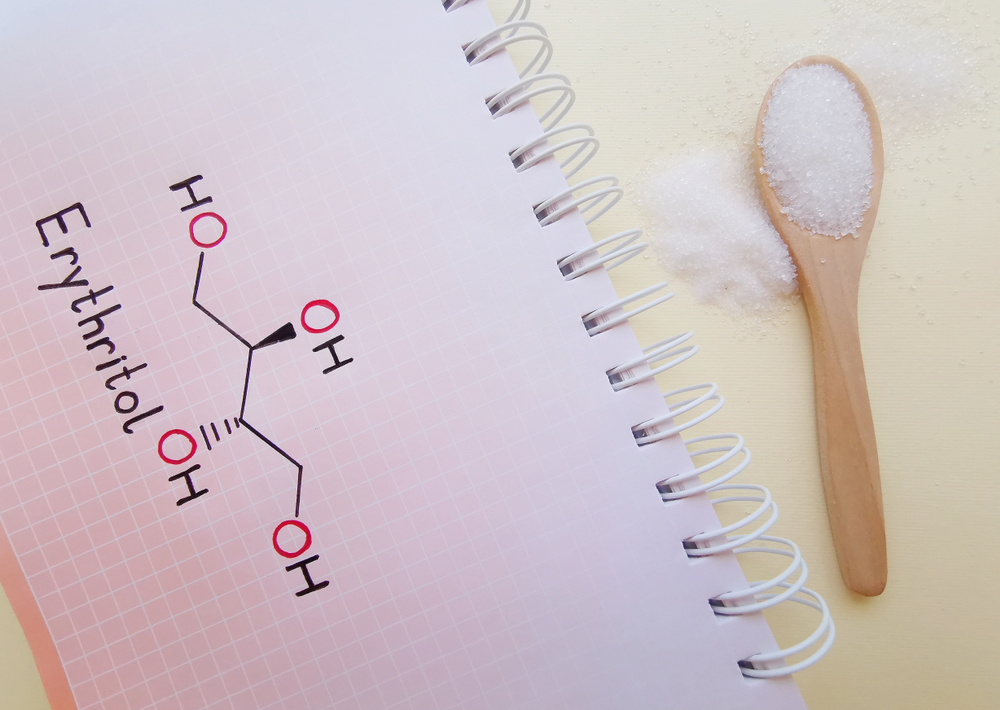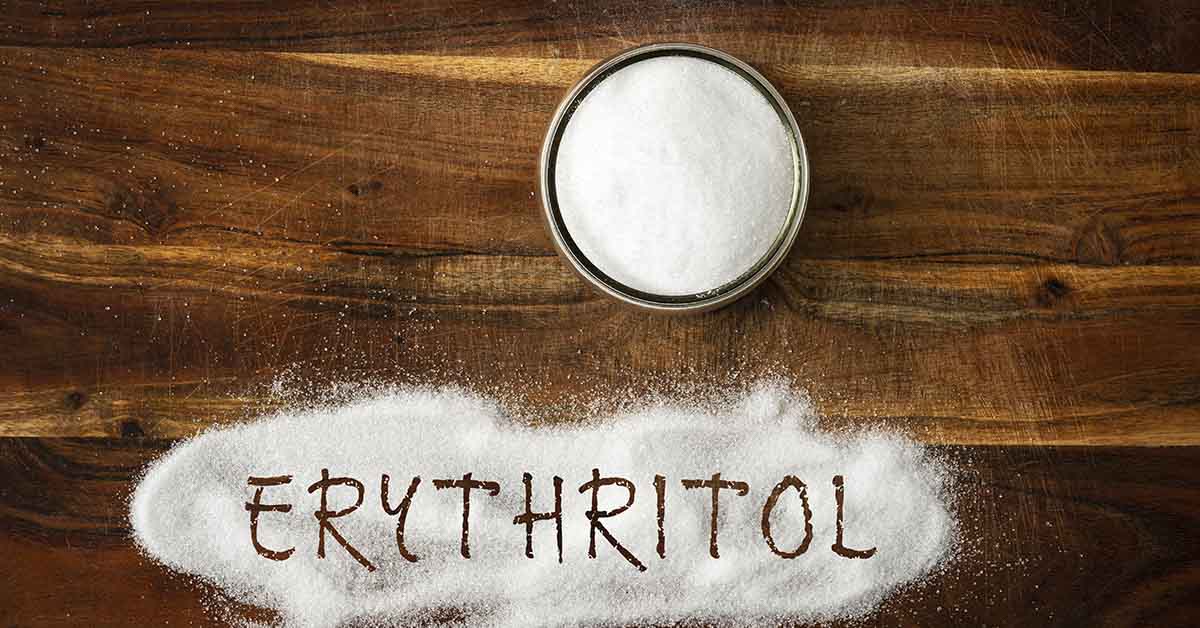Low or no-calorie sweeteners are everywhere these days, and it’s easy to see why. People want to be able to enjoy the same candies, baked goods, sodas, and other sugary treats without using calorically dense sweeteners like sugar. While they might seem like a health food miracle, some research suggests they could be too good to be true. Recent research from the Cleveland Clinic Lerner Research Institute has found that the popular low-calorie sweetener erythritol is linked to blood clotting, stroke, heart attack, and death. But what does the study really say, and is there anything to be afraid of?
Erythritol: Safe To Consume or A Danger To Your Health?

Erythritol is a sugar alcohol used as a low-calorie sweetener. It is used to add bulk or to sweeten stevia, monk fruit, and many popular keto-reduced sugar products. It’s natural, tastes almost exactly like sugar, and has zero calories. Our bodies actually produce it, only in small amounts. (1, 2)
New research from the Cleveland Clinic Lerner Research Center linked erythritol to blood clotting, stroke, heart attack, and death. For those with risk factors for heart disease, the risks of consuming erythritol were even greater. For example, people with Diabetes were twice as likely to have a stroke or a heart attack if they had the highest levels of sugar alcohol in their bloodstream. They cited additional research in their study that also showed that erythritol causes blood platelets to clot more readily.
“The degree of risk was not modest,” said lead author Dr. Stanley Hazen. “If your blood level of erythritol was in the top 25% compared to the bottom 25%, there was about a two-fold higher risk for heart attack and stroke. It’s on par with the strongest of cardiac risk factors, like diabetes.” (3)
Read More: Big Thighs Associated With Lowered Risk of Stroke and Heart Attack
How They Discovered It

When Hazen and his colleagues first began their research, they were not studying erythritol specifically. They were studying blood samples of people at risk of heart disease, looking for chemicals or compounds in their blood that might predict their risk for stroke, heart attack, and death. They studied 1,157 blood samples collected between 2004 and 2011. Hazen said he and his team noticed there was one compound in particular that seemed to greatly elevate risk, but they were unsure what that compound was. Upon further inspection, they realized that it was erythritol.
Not wanting to jump to conclusions, the research team studied more samples. This time they analyzed 2,100 people in the United States and 833 samples collected in Europe. A fifth of these sample groups had diabetes, and 75% of them had high blood pressure or coronary disease. More than 50% of the participants were men in their 60s and 70s. With each group, they found that higher levels of erythritol were connected to a greater risk of heart attack, stroke, or death within three years.
How Does Erythritol Increase Risk?

Next, they did some lab and animal tests to determine how erythritol causes such a steep jump in risk. They found that the sugar alcohol causes blood platelets to clot more easily. While clotting is important for wound healing and preventing us from bleeding to death from a simple cut, too much is a big health risk.
Normally, when we get a cut or a wound, our platelets respond by clotting just to what is needed. A 10% cut, for example, will produce a 10% clotting response. When high quantities of erythritol are found in the blood, however, this causes our platelets to become super responsive. A 10% cut, for example, could produce a 90% or even a 100% platelet response. Those clots can then break off and travel to the brain and cause stroke or travel to the heart and cause a heart attack. They also block our arteries and can eventually cut off blood flow, leading to a stroke or a heart attack.
Read More: 9 Heart Attack Symptoms That Are Frequently Misdiagnosed
Study Backlash

There has been some backlash regarding this study from academics, doctors, dieticians, and other health professionals. One in particular is Dr. Idrees Mughal who is more commonly known by his social handle Dr. Idz. He is known for debunking health trends and has over 1.6 million followers on TikTok alone. Dr. Idz claims that here healthy individuals have little to worry about. He discusses this more in the video below.
Dr. Matthew Nagra, ND is a naturopathic doctor who is known for his knowledge of translation and breakdowns of complex nutrition science. His take on the study is outlined below in a video he created for his account on Instagram.
Dr. Layne Norton, PhD has a doctorate in Nutritional Sciences from the University of Illinois. He is known for his ‘no-bull’ approach to breaking down nutrition science and has over 750 thousand followers on Instagram. His take on the study is outlined below in a video posted to his account.
An Association, Not Proof

Regardless of the criticism noted above, Hazen and his team say that their research gives some pretty convincing evidence that you’d be wise to steer clear from erythritol for the time being. They did, however, state that more research needs to be done. These findings are concerning, but they are associative, and not causal. This means that erythritol may not be directly increasing the risk of heart attack or stroke, but other factors may also be at play. Since a majority of the cohort had comorbidities (i.e. diabetes, high blood pressure) and are 65+, they are already at a higher risk for stroke or heart disease.
This is where something known as ‘reverse causality’ comes into play. Are high levels of erythritol in the blood driving the increased risk? Or do pre-existing conditions like coronary disease and diabetes cause erythritol to increase in the blood? It’s hard to know. At this point, the research is not definitive, and we can still not say that erythritol consumption, especially at low levels, increases your risk of stroke, heart attack, and death.
Read More: The Surprising Difference Between Heart Attack and Cardiac Arrest
Sources
- “The artificial sweetener erythritol and cardiovascular event risk.” Nature. Marco Witkowski, et al. February 27, 2023.
- “Erythritol — Like Sugar Without the Calories?” Healthline. Kris Gunnars, BSc. November 18, 2021.
- “Zero-calorie sweetener linked to heart attack and stroke, study finds.” CNN. Sandee LaMotte. February 28, 2023.

